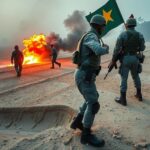Conflicts
ARAKAN ARMY, ASIA, AUNG SAN SUU KYI, BANGLADESH, CHIPWI, CIVIL WAR, GUARDIAN, JUNTA, KACHIN, KACHIN STATE, KAWLIN, KOKANG, KOKANG SELF - ADMINISTERED ZONE, LAUKKAI, MAUNGDAW, MILITARY, MNDAA, MYANMAR, NATIONAL UNITY GOVERNMENT, PANGWA, PEOPLE ’ S DEFENCE FORCE, PINLEBU, RA, RAKHINE, RAKHINE STATE, SAGAING, SECURITY, TERRORISM
Nia Simpson
Myanmar Junta Faces Setbacks as Rebel Forces Gain Ground in Civil War
The ongoing civil war in Myanmar continues for its fifth year, with rebel groups making substantial gains against the junta. Recent reports indicate that significant territories, including towns and key regions, have fallen under rebel control. This shift has not only altered the military landscape but also boosted morale among pro-democracy factions struggling against the military regime.
The civil war in Myanmar, now entering its fifth year, has seen significant progress by rebel armed opposition groups against the ruling military junta. As reported by The Guardian, these gains have noticeably improved the morale of pro-democracy movements throughout the country. Notably, 95 towns have come under the control of various opposition factions, according to Myanmar Peace Monitor’s analysis.
In the northern region of Kachin State, the military suffered considerable setbacks last year, losing over 200 military bases and 14 towns, including key mining sites in Chipwi and Pangwa. In the western state of Rakhine, almost complete control has shifted to rebel forces, with the Arakan Army claiming dominance over Maungdaw, the last military stronghold in the area, thereby securing the entire 271 km border with Bangladesh.
The People’s Defense Forces have also made important territorial advances in Central Sagaing, seizing towns like Kawlin and Pinlebu, crucial for supply transport. Reports indicate that military control now encompasses only approximately 21% of Myanmar’s territory, despite retaining authority over densely populated cities, as corroborated by a study commissioned by the BBC.
In late 2023, the Myanmar National Democratic Alliance Army made significant strides by capturing Laukkai, the capital of the Kokang Self-Administered Zone, further challenging the junta’s military hold. The rise in conflict could potentially destabilize the region, impacting the opium trade, which saw a minor decrease of 4% this year.
Notably, Rohingya insurgents from refugee camps in Bangladesh have joined the fight against the ruling junta, prompted by the violence that led to their mass exodus in 2017. The turmoil escalated sharply following the military coup in February 2021, which ousted the democratically elected leadership led by Aung San Suu Kyi.
This coup catalyzed widespread civil unrest and ignited a protracted conflict, resulting in clashes between the military junta and various resistance groups such as the National Unity Government (NUG) and the People’s Defense Force (PDF). Since the escalation of hostilities, over 50,000 individuals have lost their lives, and millions have been displaced across Myanmar.
In summary, the conflict in Myanmar has intensified as rebel forces achieve significant territorial claims against the junta. While military control is significantly diminished, the situation remains volatile, impacting both local stability and broader regional issues like drug production. The involvement of Rohingya insurgents also highlights the complexities of the conflict, which has resulted in devastating humanitarian consequences since the military coup.
Original Source: www.firstpost.com








Post Comment